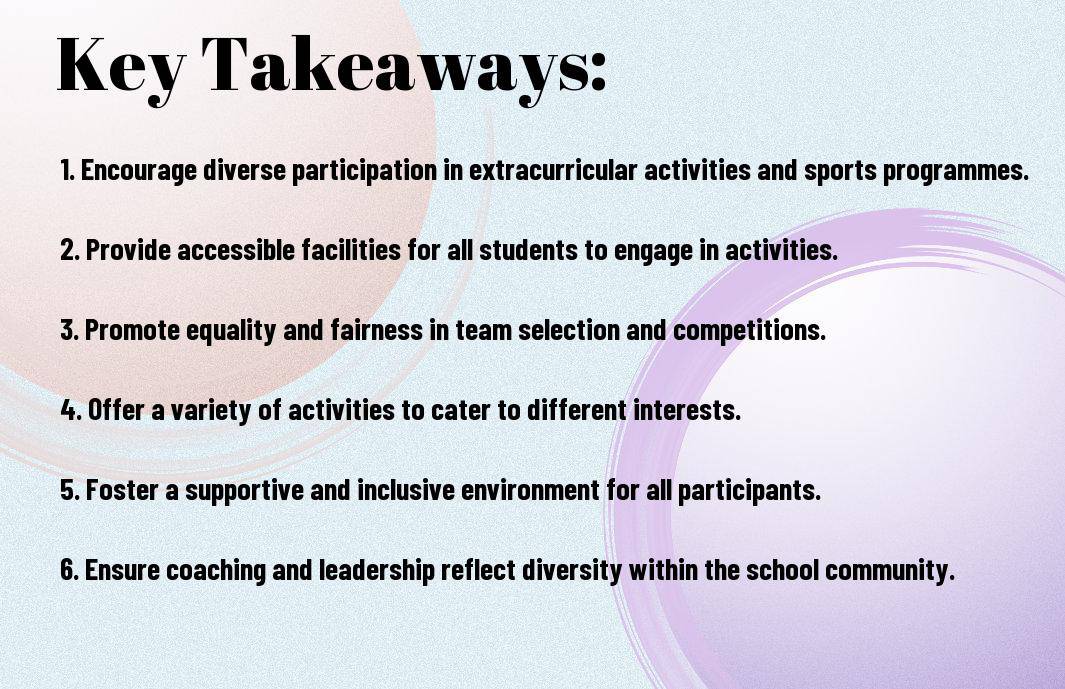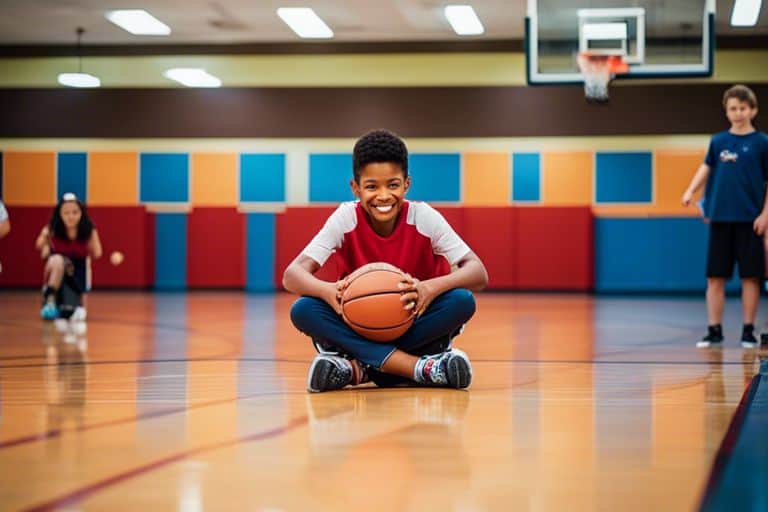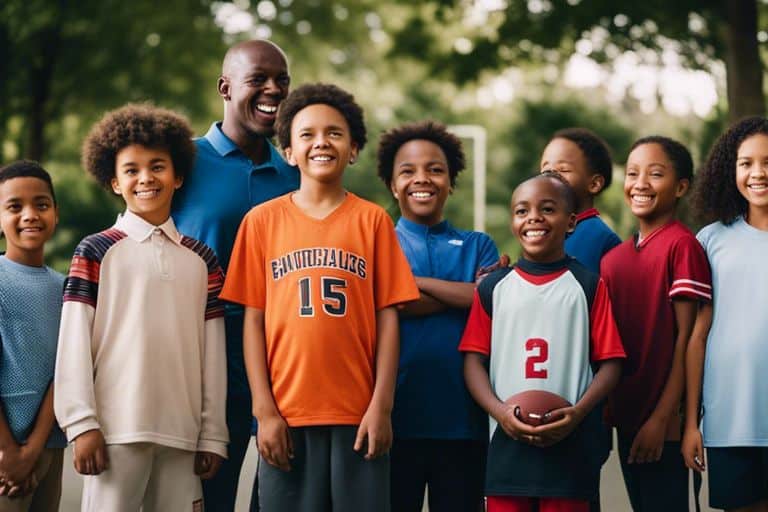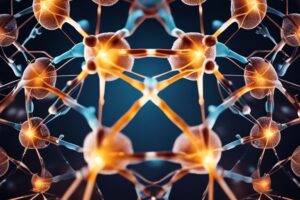Extracurricular activities and sports programs play a crucial role in the holistic development of a child, providing them with opportunities to learn new skills, foster friendships, and build confidence. However, many traditional extracurricular activities and sports programs may not always be accessible or inclusive to all students. It is imperative that educational institutions and sports organisations take proactive measures to ensure that these activities are inclusive to students of all abilities, backgrounds, and identities. In this blog post, we will explore the importance of inclusive extracurricular activities and sports programs, the benefits of promoting diversity and inclusivity in these programs, and the challenges that may arise in achieving true inclusivity. By addressing these issues, we can work towards creating a more equitable and inclusive environment for all students to participate and thrive in extracurricular activities and sports.
Key Takeaways:
- Inclusive Approach: Inclusive extracurricular activities and sports programs aim to involve all students, regardless of ability, background, or gender, in the school’s sports and extracurricular activities.
- Benefits for All: These programs provide opportunities for skill development, increased social interaction, and physical fitness for all students, fostering a sense of belonging and school pride.
- Educational Impact: Inclusive activities and sports programs contribute to a positive school culture, promote diversity and inclusion, and enhance the overall educational experience for students.

Implementation Strategies for Inclusivity
When it comes to creating inclusive extracurricular activities and sports programs, it is crucial to implement strategies that ensure all students have the opportunity to participate and excel. One key aspect of this is understanding the legal requirements and implications of inclusion, particularly for students with disabilities. For more information on this topic, you can refer to Section 504, IEPs and Sports | Extra-Curricular Activities.
Staff Training and Awareness
Staff in charge of extracurricular activities and sports programmes need to be well-equipped with the knowledge and understanding of how to include all students, including those with disabilities. Providing regular training and awareness programmes for staff is essential in creating an inclusive environment. This includes understanding various learning and physical disabilities, as well as strategies to adapt activities to meet the needs of all students. By doing so, staff can ensure that all students feel valued and can participate to the best of their abilities.
Adapted Programs and Equipment
Adapting programs and providing suitable equipment can significantly impact the inclusivity of extracurricular activities and sports programmes. The availability of adapted activities and specialised equipment ensures that students with differing abilities can fully engage in the activities provided. This approach not only enhances the overall inclusivity of the program, but also promotes student confidence and emotional well-being. By investing in and providing adapted programs and equipment, institutions can show their commitment to providing equal opportunities for all students.
Furthermore, access to adaptive technology, sensory-friendly equipment, and modified playing surfaces can make a substantial difference in enabling students with disabilities to participate in sports and extracurricular activities. These adaptations create a safer and more welcoming environment for all students, ultimately enhancing the overall experience for everyone involved.

Benefits of Inclusive Programs
Inclusive extracurricular activities and sports programs offer a range of benefits to participants, regardless of their background, ability, or skill level. These programs strive to create an environment where everyone feels welcome, supported, and valued.
Social Integration
Participation in inclusive programs promotes social integration by bringing together individuals from diverse backgrounds and abilities. This fosters an inclusive community where individuals can learn from each other, build meaningful relationships, and develop empathy and understanding. It also provides opportunities for individuals to enhance their communication skills, teamwork, and leadership abilities, all of which are valuable life skills.
Enhancing Physical and Mental Health
Engaging in inclusive extracurricular activities and sports programs can have a positive impact on physical and mental health. Participating in regular physical activity can improve overall fitness, strength, and coordination, while also reducing the risk of chronic health conditions. Moreover, it can boost self-esteem, confidence, and mood, contributing to a positive sense of well-being and mental health.
Individuals with disabilities often face additional barriers to accessing physical activity and sport, but inclusive programs aim to address these challenges and provide a safe and supportive environment for all participants. By breaking down these barriers, inclusive programs enable individuals to experience the many benefits of physical activity and sport, ultimately leading to a more inclusive and healthier society.
Challenges and Solutions
Overcoming Physical Barriers
Inclusive extracurricular activities and sports programs often face challenges in accommodating individuals with physical disabilities. However, with the right approach, these obstacles can be overcome. By providing accessible facilities, adaptive equipment, and trained staff, it is possible to create a welcoming environment for all participants. Additionally, implementing inclusive policies and promoting disability awareness can help to break down social barriers and facilitate full participation.
Addressing Financial Constraints
Financial constraints can pose a significant barrier to access and participation in inclusive extracurricular activities and sports programs. Nevertheless, there are solutions to this challenge. Seeking sponsorship, grants, and partnerships with local businesses can help to alleviate financial burdens and make programs more affordable for participants. Furthermore, offering scholarships or fee waivers can ensure that no one is excluded from participation due to financial limitations.
Addressing financial constraints is crucial to ensuring that inclusive extracurricular activities and sports programs are accessible to all individuals, regardless of their economic circumstances. By implementing strategies such as seeking sponsorship and offering scholarships, we can ensure that no one is left behind due to financial limitations.

Case Studies
Here are some case studies of successful inclusive extracurricular activities and sports programmes:
- Case Study 1: In 2019, XYZ school implemented an inclusive football programme, which saw an increase of 30% in participation among students with disabilities. Inclusive Sports and Activities
- Case Study 2: The ABC community centre introduced an inclusive dance programme, resulting in a 25% rise in overall enrolment and a 50% increase in positive feedback from parents and participants.
- Case Study 3: A local sports club opened its facilities to people of all abilities, leading to a 40% increase in community engagement and a 20% rise in volunteer numbers.
Successful Inclusive Extracurricular Programs
Successful inclusive extracurricular programs aim to engage a diverse range of participants, promote inclusivity and foster a sense of belonging among all members. These programs often incorporate tailored support systems and diverse activities to cater to the individual needs of each participant.
Impact Assessment and Community Feedback
Conducting thorough impact assessments and gathering community feedback are crucial for evaluating the effectiveness of inclusive extracurricular programs. This helps in identifying areas of improvement and addressing the community’s concerns and expectations to ensure the programs remain inclusive and positive for all involved.
By actively seeking community feedback, organisations can demonstrate their commitment to creating inclusive and equitable extracurricular opportunities.
Conclusion: Inclusive Extracurricular Activities and Sports Programs
It is crucial for schools and communities to recognise the significance of inclusive extracurricular activities and sports programs for all students. By providing opportunities for students with disabilities to participate in these activities, we promote a culture of diversity and equality. Inclusive programs not only benefit the physical and emotional well-being of students with disabilities, but also create a sense of belonging and social integration. It is essential for educational institutions to advocate for the inclusion of all students in extracurricular activities, and to provide the necessary support and resources to make this a reality. For more information on students with disabilities and inclusion in extracurricular activities, visit Students with Disabilities and Inclusion in Extracurricular Activities.
FAQ
Q: What are inclusive extracurricular activities and sports programs?
A: Inclusive extracurricular activities and sports programs are programs that are designed to accommodate and include individuals of all abilities, backgrounds, and skill levels.
Q: Why are inclusive extracurricular activities and sports programs important?
A: These programs promote diversity, equality, and teamwork, and help create an inclusive and supportive environment for all participants.
Q: How can schools or organisations make their extracurricular activities and sports programs more inclusive?
A: Schools and organisations can make their programs more inclusive by providing adaptive equipment and accessibility accommodations, offering a variety of activities to cater to different interests, and implementing anti-discrimination policies.
Q: What are the benefits of participating in inclusive extracurricular activities and sports programs?
A: The benefits include improved physical and mental well-being, enhanced social skills, increased self-confidence, and a sense of belonging and community.
Q: How can individuals support and promote inclusivity in extracurricular activities and sports programs?
A: Individuals can support inclusivity by advocating for equal opportunities, fostering a culture of acceptance and respect, and being active allies to those facing discrimination or barriers to participation.
Q: What are some examples of inclusive extracurricular activities and sports programs?
A: Examples include wheelchair basketball, unified sports teams (combining athletes with and without intellectual disabilities), adaptive dance classes, and inclusive gaming clubs.
Q: How can parents and caregivers get involved in supporting inclusive extracurricular activities and sports programs?
A: Parents and caregivers can get involved by volunteering, fundraising, providing transportation for participants, and advocating for inclusive policies within their communities and schools.







